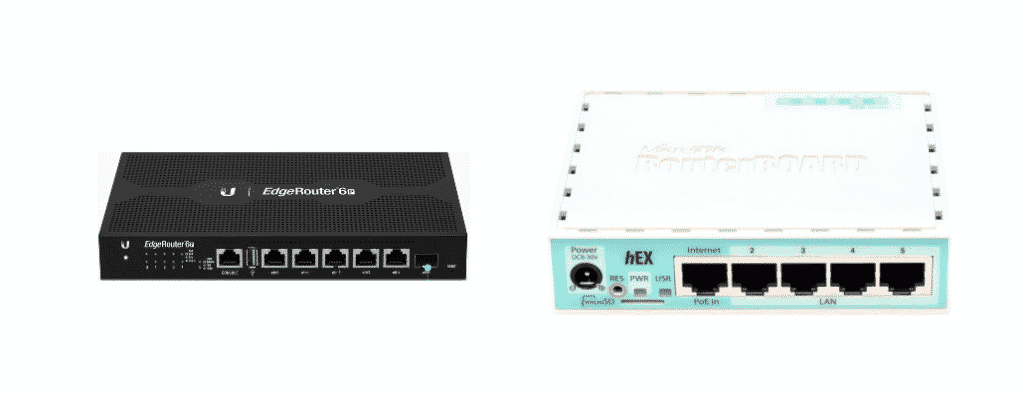
Ubiquiti’s Edgerouter and Mikrotik routers have been on the top of our telecommunication and networking field for a long time. Different people tend to have a few differing opinions about the two products. Some of them believe that Ubiquiti should stick to making devices that operate on wireless technology and prefer Mikrotik routers for routing purposes. But although both of them are cheap alternatives to Cisco routers, it can’t be denied that Mikrotik routers require progressing through a steep learning curve. Also, the popularity of Ubiquiti’s 1G/10G Unify switches is undeniable.
Edgerouter vs Mikrotik
Here in this article, we will be comparing the two companies and their products, we will see how they fare when looked at side by side.
Pros
Using a Mikrotik router will have the following benefits:
- It provides you with a Dual-stack IPv4 to IPv6.
- It has a user-friendly interface that is easy to manage.
- Employing a Mikrotik router for networking will provide you with multiple secure connections.
- They are cheap to buy, a normal Mikrotik router is sold for 109 US dollars.
Now that we have listed the benefits of using a Mikrotik router, let’s see what benefits the Ubiquiti’s Edgerouter provides:
- Buying access points for your Edgerouter will not bankrupt your bank account. Edgerouter access points are surprisingly affordable.
- Aside from being affordable, the access points are also highly reliable. I will cause no issues when using indoors and other closed/covered outdoor places.
- It has a user-friendly interface that is easy to manage.
- Covering your outdoor spaces with dual-band Wi-Fi can be done effectively through an outdoor mesh access point and a directional antenna. Doing this is much more efficient and cost-effective than buying an expensive access point.
- This is an extremely powerful router but it’s designed to be user friendly.
- Its remote management system is also top-notch.
- The community support for the product is phenomenal. Any issues you might have can be solved by asking the right questions. The community helps you in every way possible.
- The simple yet organized interface along with a singular control panel allows you to manage a large number of sites easily. Similarly, any new access point that you might add in the future could be integrated into the system with ease due to the organized structure.
- The Ubiquiti site has a great support system. From the website, you can download documents that will provide detailed analysis regarding every single function.
- The cost of using this router is a lot less than many other similar devices.
- This is the cheapest router that allows you to do bi-directional gigabit.
- Its allot cheaper as compared to other routers especially Cisco. You can buy a new Ubiquiti router for 250 IS dollars. Although more expensive than a Mikrotik router, it’s still worth it to buy at this price.
Cons
The unsavory elements of using a Mikrotik router are as follows:
- The company provides no customer support. If a user is bothered by an issue all he can do is ask the community.
There is not much to complain about when it comes to Mikrotik routers, but what about an Edgerouter, the cons of using an Edgerouter are as follows:
- Its firmware quality is right around average. Plagued with a series of bug-related issues, using the firmware may pose a few problems. Its also extremely annoying to deal with.
- The controller software does not run on a server, this makes completing certain tasks a lot harder.
- Even though it runs on a server, a user only has access to 5 days worth of client history.
The chips used in Ubiquiti Edgerouters are made from Cavium which means they have some room for programmable hardware. Whereas Mikrotik routers are all software-based.
If you truly analyze the specifications and functionality of both routers. You will conclude that comparing Ubiquiti’s Edgerouter and Mikrotik routers no one is better than the other. Both have their strengths and weaknesses and both have their places where they can be utilized to their utmost potential. It’s not about who is better, it’s about what you the consumer wants. So we advise you to thoroughly analyze your problem and see which router suits your needs.
Hopefully, you had gleaned some useful information through this article.